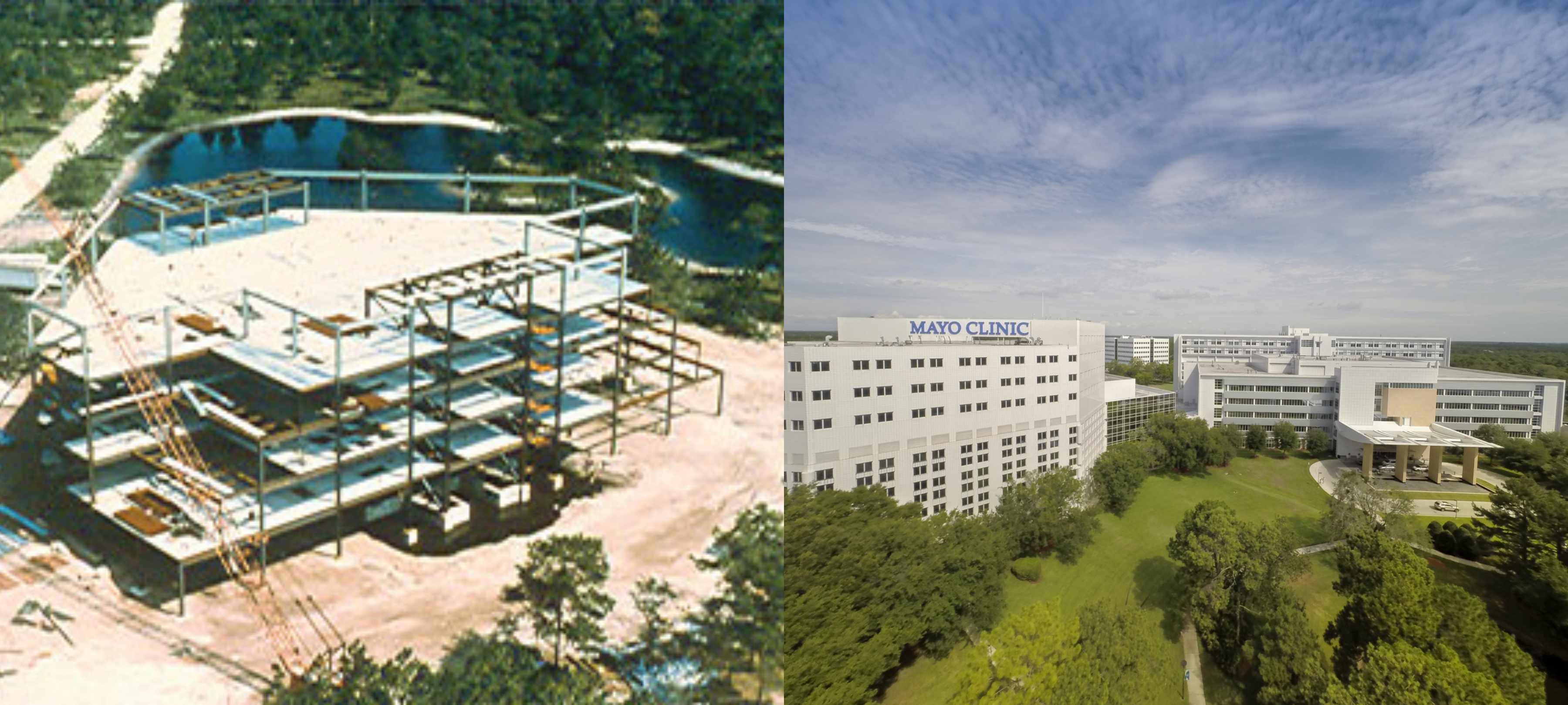-
Featured News
Mayo Clinic celebrates 30 years in Florida

The land in 1986 when Mayo Clinic in Florida was first being developed, graciously donated by the Davis family; and the campus today.
JACKSONVILLE, Fla. — Mayo Clinic’s campus in Florida is celebrating 30 years of providing high-quality medical care in Northeast Florida. Since the clinic opened in 1986, more than 600,000 unique patients from all 50 states and 143 countries have come to the Florida campus for Mayo’s unique, patient-centered approach to medical care.
“Innovation is in our DNA at Mayo Clinic,” says Gianrico Farrugia, M.D., CEO, Mayo Clinic in Florida. “Through three decades of growth, Mayo Clinic’s campus in Florida has invested in people, space and technology to carry forward the vision of our founders and meet the needs of patients, today and into the future.”
The expansion into Northeast Florida marked the first time Mayo Clinic established a location outside of Rochester, Minnesota. The Davis family of Jacksonville played a significant role in Mayo Clinic’s decision to open a satellite campus. Having received excellent medical care in Rochester, the family rallied support for fundraising and donated about 400 acres on San Pablo Road where the campus was constructed. Mayo Clinic opened a campus in Scottsdale, Arizona, in 1987.
Since opening its doors in Jacksonville, Mayo has grown from one five-story building to three main patient care buildings, a hospital, two research buildings and a collection of freestanding primary care centers, administrative buildings and support facilities. Mayo Clinic’s campus in Florida started with just 35 physicians and 145 support staff. Today, the campus has about 5,500 employees and an annual impact of $2 billion on the Florida economy. And Mayo Clinic recently announced plans for a $100 million expansion in Florida.
MEDIA CONTACT: Paul Scotti, Mayo Clinic Public Affairs,
507-284-5005, newsbureau@mayo.edu
Mayo’s 30 years in Jacksonville has produced several milestones in patient care, education and research, including:
- Opening a brain bank in 1991 that has since become the foundation for several groundbreaking neuroscience discoveries.
- Collaborating with other local providers to launch Jacksonville’s first – and only – bone marrow transplant program in 1992.
- Starting residency and fellowship programs in 1993. Today, the campus has 49 graduate medical education programs and 33 training programs for health sciences careers.
- Treating tremor with the first deep-brain stimulation procedure in 1997.
- Discovering in 1998 the first genetic cause for frontotemporal dementia, the second most common dementia.
- Performing more than 5,700 organ transplants, including liver, heart, lung, kidney and pancreas transplants, as well as multi-organ procedures, since opening its transplant center in 1998.
- Developing a pioneering lab model to study Alzheimer’s disease in 2001.
- Receiving Comprehensive Cancer Center designation from the National Cancer Institute in 2002.
- Identifying in 2004 the most common genetic cause worldwide of Parkinson’s disease.
- Opening Mayo Clinic hospital on the Jacksonville campus in 2008 to integrate inpatient and outpatient care. With 304 beds and 22 operating rooms, the hospital offers care in 20 medical and 15 surgical specialties. The hospital also has a full-service Emergency Department open to the public.
- Offering the area’s first robotic surgery for less-invasive partial knee replacement surgery in 2010.
- Opening the Gabriel House of Care in April 2011 to help transplant and cancer patients who must stay near the clinic for treatment. (The 30-room, extended-stay facility is located on campus and provides affordable housing for patients and their families).
- Opening the new $3.8 million, 10,000-square-foot freestanding sleep center in July 2011. (Mayo Clinic treats nearly 1,000 sleep disorder patients annually in Jacksonville.
- Identifying in 2012 a gene critical to the development and spread of lung cancer.
- Opening the Wayne and Delores Barr Weaver Simulation Center in February 2013, a 9,600-square-foot space where medical teams and community organizations can learn and practice skills in a risk-free environment.
- Opening an individualized medicine clinic in 2013.
- Receiving Cancer Center of Excellence designation in 2014 from the state of Florida. (Only four centers in the state hold this distinction).
- Earning national Comprehensive Stroke Center certification in 2014. (Mayo Clinic was the first center in Florida to receive the certification).
- Receiving Magnet designation from the American Nursing Credentialing Center in 2015.
- Obtaining a $13.3 million federal grant in 2015 to test an innovative breast cancer vaccine.
- Receiving three pre-eminent, international awards for neuroscience research in 2016.
- Opening a new cardiac catheterization lab in 2016 to meet growing demand for the expertise and advanced procedures available in the Division of Cardiovascular Diseases.
- Ranking 1 in Florida in U.S. News and World Report’s 2016 list of top hospitals.
- Announcing a $100-million expansion that will include an innovative destination medical building for cancer care, as well as neurologic and neurosurgical care, and a state-of-the-art radiochemistry laboratory and cyclotron.
Visit the campus timeline for a more detailed look at the Florida campus’ 30-year history.
“We will never lose the humanistic aspect of health care and will stay true to our primary value: ‘The needs of the patient come first,’” Dr. Farrugia says. “We are building on a tremendous foundation to serve as the destination medical center of the Southeast for patients with the most complex medical problems. Of course, we will continue to collaborate with other institutions, companies, and our friends and benefactors, without whom Mayo Clinic would not exist. Together, we will lead the future of health care.”
###
About Mayo Clinic
Mayo Clinic is a nonprofit organization committed to clinical practice, education and research, providing expert, whole-person care to everyone who needs healing. For more information, visit http://www.mayoclinic.org/about-mayo-clinic or https://newsnetwork.mayoclinic.org/.







